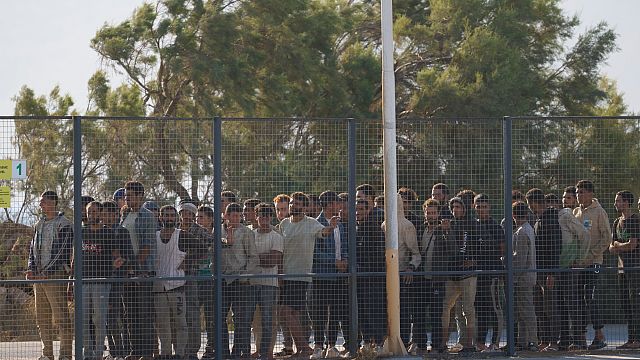Over 500 migrants reached the Port of Lavrio near Athens, their journey intercepted south of Crete. The group, mainly young men, had been aboard a fishing trawler before Greek authorities transferred them overnight to a bulk carrier. Service vessels guided them to the mainland port, where they are to be taken to detention facilities near the capital. This influx comes amid emergency measures implemented by Greece to address a surge in Mediterranean crossings from Libya.
The decision to transfer the migrants to mainland Greece was prompted by overcrowded reception centers on Crete, where approximately 500 new arrivals have been recorded daily since the weekend. Prime Minister Kyriakos Mitsotakis announced the suspension of asylum processing for migrants arriving by sea from North Africa for three months, focusing on those arriving on Crete. This move reflects the strained relations between the European Union and Libya regarding migration cooperation. Earlier this week, EU officials were denied entry to eastern Libya, signaling discord over talks aimed at reducing migrant crossings.
Authorities on Crete are facing challenges in providing adequate services, resorting to temporary facilities to accommodate migrants primarily from Somalia, Sudan, Egypt, and Morocco. The situation underscores the broader complexities of migration management in the Mediterranean region.
Greece’s suspension of asylum processing underscores the urgency of addressing the influx of migrants and the need for coordinated efforts among EU members and North African countries.
As makeshift reception centers struggle to cope with the continuous arrivals, the humanitarian situation on Crete highlights the pressing need for sustainable solutions. The suspension of asylum applications reflects a temporary measure to alleviate the burden on the island’s resources and infrastructure.
The diplomatic tensions between the EU and Libya not only impact migration policies but also underscore the broader geopolitical challenges in managing migration flows across the Mediterranean.
The influx of migrants from North Africa to Greece sheds light on the complexities of migration dynamics and the need for comprehensive strategies to address the root causes driving these movements. As the situation unfolds, it calls for a nuanced approach that balances humanitarian concerns with security considerations and regional cooperation.
In conclusion, the recent developments in Greece regarding the suspension of asylum applications for sea arrivals from North Africa underscore the multifaceted challenges posed by migration in the Mediterranean. The need for coordinated action, sustainable solutions, and diplomatic engagement remains crucial in navigating the complexities of migration management and addressing the humanitarian needs of migrants in the region.

